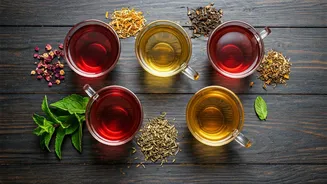Tea's Heart Benefits
Herbal teas, beyond their soothing qualities, provide various health advantages, particularly for the heart. Unlike traditional tea made from the Camellia
sinensis plant, herbal teas are made from various herbs, spices, and flowers, often containing beneficial compounds. These compounds, such as antioxidants and anti-inflammatory agents, can help lower cholesterol levels. This is critical because high cholesterol can cause the buildup of plaque in arteries, leading to heart disease. Including herbal teas in your daily life can contribute to reducing cholesterol levels, which in turn benefits cardiovascular health. Moreover, they are naturally caffeine-free, making them suitable for any time of day.
Hibiscus' Cholesterol Fighter
Hibiscus tea, known for its vibrant red hue and tart taste, is recognized for its capacity to lower LDL (bad) cholesterol and triglycerides. Studies indicate regular consumption can significantly reduce these harmful levels. Furthermore, hibiscus has properties that may support blood pressure management, offering a dual benefit for heart health. For optimal results, brew hibiscus tea using dried hibiscus flowers, allowing it to steep for several minutes to extract maximum flavor and health benefits. The tea can be enjoyed hot or cold, making it a versatile option for any season. Besides its impact on cholesterol, hibiscus tea can also support liver health due to its antioxidant content, contributing to overall metabolic well-being.
Green Tea's Power
Green tea, a cornerstone of East Asian culture, is packed with catechins, powerful antioxidants associated with various health benefits, including cholesterol reduction. Research demonstrates that green tea consumption can reduce both total and LDL cholesterol levels. Additionally, green tea can improve the ratio of HDL (good) cholesterol, which is essential for heart health. To maximize its effects, choose high-quality green tea leaves and steep them in hot (but not boiling) water for a few minutes. While green tea contains some caffeine, its lower levels compared to coffee make it a gentler choice. Besides its cardiovascular benefits, green tea offers cognitive enhancements and supports metabolic health due to its potent antioxidant profile.
Oolong Tea's Role
Oolong tea, a partially oxidized tea, offers a range of health benefits, including cholesterol management. It contains compounds that can influence lipid metabolism, potentially lowering LDL cholesterol levels. Regular consumption of oolong tea can improve cholesterol profiles and contribute to overall cardiovascular health. The key to brewing oolong tea is to use water that is just off the boil, and to steep it for a few minutes to unlock its complex flavor profile. Oolong tea can be enjoyed throughout the day, providing a pleasant taste and a subtle energy boost. Its rich antioxidants not only support heart health but also aid in weight management and general wellness.
Artichoke Tea Benefits
Artichoke tea, derived from the leaves of the artichoke plant, is a lesser-known but powerful ally for cholesterol management. It contains compounds that stimulate bile production, which helps the body eliminate cholesterol. Research reveals that artichoke tea can decrease total cholesterol and LDL cholesterol levels. Preparing artichoke tea involves steeping dried artichoke leaves in hot water. The tea has a unique, slightly bitter taste, which can be improved with lemon or honey. Its cholesterol-lowering properties, combined with its potential to support liver function, make artichoke tea a valuable addition to a heart-healthy diet. Furthermore, artichoke tea is rich in antioxidants, contributing to overall health and vitality.













